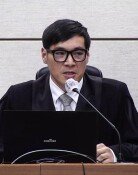[Editorial] How Could Government Recover Economy without Caring Peoples Livelihood?
[Editorial] How Could Government Recover Economy without Caring Peoples Livelihood?
Posted October. 21, 2005 03:04,
The opposition Grand National Party has attacked Cheong Wa Dae for not doing enough to combat economic stagnation. Responding to this, Cheong Wa Dae said, It is the current participatory government and Kim Dae-jung government which rescued this nations economy that was crippled by financial crisis in 1997, with the support of people.
But since the inauguration of President Roh Moo-hyun, there have been no signs of economic recovery. The unemployment rate is still high, and in terms of financial investment, consumption and peoples incomes, there is nothing about the economy that is better off now than it was before. Instead, low economic growth is fanning peoples anxieties of a bleak future. We are wondering in which sectors and how the government has made contributions to the enhancement of the peoples livelihood and the economic situation.
We are also wondering if the government is special enough to ignore the current declining economic growth rate (three to four percent for the past three years). The potential growth rate, which is used as a barometer for future economic growth, is now lower than five percent, an unprecedentedly low figure that has people worried. Based on this rate, some analysts predict the potential growth rate will fall into the four percent range due to a lack of investment.
If this disappointing outcome is due to investment in future businesses, this can be overlooked. However, the Roh administration, since its inauguration, has been on the side of labor unions. As a result, company restructuring efforts have often been in vain.
The government gave a green light to a halt in the privatization of public organizations, which imposed burdens on taxpayers. Instead of building political policy measures that boost economic recovery, the government has even dampened burgeoning signs of recovery. But the government doesnt seem to feel any guilt or responsibility for the nations current economic panic. We hear government officials saying, We will not take any artificial measures to stimulate the economy, in order to rationalize their economic policy direction. However, this is nothing but an evidence of the governments inability to present delicate policy measures.
The government that made people unable to pay taxes is squeezing people to pay taxes and is worsening the governments financial condition due to its reckless management of the national budget.
Cheong Wa Dae has used the corruption index, the world competitiveness index, sovereign credit ratings, export totals, and the stock market index as a proof that the nation is not mired in an economic downturn. However, it is possible for the economy to fall even when corruption is declining. In addition, many of the other achievements cited by the government have been made by the private sector, not by the government. Contrary to rival countries that are working to build market-friendly environments, the Korean government has been busy attacking conglomerates and paralyzing market mechanisms. Even the Federation of Korean Industries that usually keeps a low profile due to the pressure from political sector exclaimed that, Please stop being so harsh on companies. Full credit must go to companies that have managed to post successful business performance records under such circumstances.
The more strongly the government argues that it is well managing the nations economy, the more peoples distrust to the government increases. The current government attitude on economic management makes people feel uneasy and the future gloomier.






![“설거지해도 그대로”…냄비 ‘무지개 얼룩’ 5분 해결법 [알쓸톡]](https://dimg.donga.com/c/138/175/90/1/wps/NEWS/IMAGE/2026/01/15/133164664.3.png)
